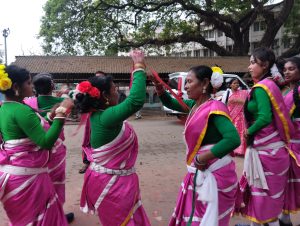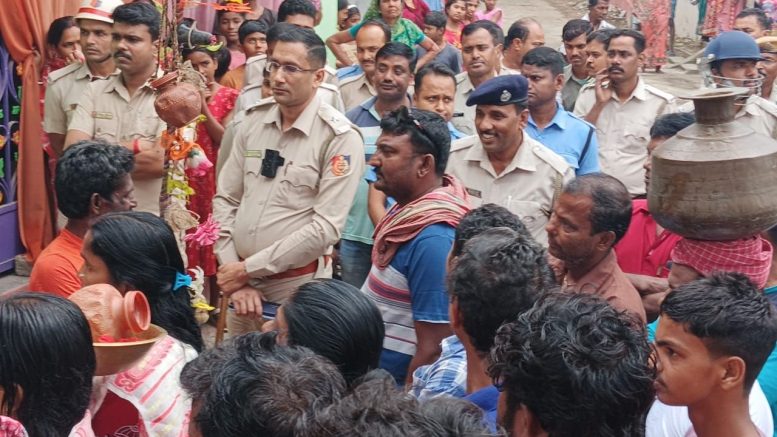Calcutta/Krishnanagar; March 21: The Nadia district administration has informed the Calcutta High Court that it has taken necessary steps to ensure Scheduled Caste community members enter and offer puja at a Shiva temple in Bairampur village, Kaliganj. The report was submitted before Justice Tirthankar Ghosh on Friday, following the court’s observations earlier in the week.
The case reached the High Court on Monday when Scheduled Caste residents of Bairampur filed a petition alleging that local police had failed to secure their right to enter the 300-year-old temple. Their lawyer informed the court that upper-caste members had been preventing them from offering prayers.
Hearing the plea, Justice Ghosh expressed dismay. “It is a matter of shame that such a system still prevails in Bengal,” he remarked. He further observed, “Such incidents can only happen if the police are not active enough.” The judge directed the Superintendent of Police, Krishnanagar PD, and the district judge to ensure that the petitioners could enter the temple and participate in religious activities.
On Friday, the Nadia administration submitted a report confirming compliance with the court’s directive.
 Justice Ghosh then ordered the Nadia District Judge to monitor the situation at the temple and ensure that members of the isolated Dhopa community could take part in the upcoming Gajan festival without obstruction. He mandated that police submit reports every three days until the festival concludes, adding that if any unrest arises, the superintendent of police, Krishnanagar must take immediate action. “If necessary, additional forces will be deployed,” he said.
Justice Ghosh then ordered the Nadia District Judge to monitor the situation at the temple and ensure that members of the isolated Dhopa community could take part in the upcoming Gajan festival without obstruction. He mandated that police submit reports every three days until the festival concludes, adding that if any unrest arises, the superintendent of police, Krishnanagar must take immediate action. “If necessary, additional forces will be deployed,” he said.
Following the court’s intervention, members of the marginalized community were allowed entry into the temple on Thursday afternoon, marking the end of a nearly 300-year-old tradition of exclusion. For generations, Scheduled Caste residents had been barred from the temple, but under police protection, they finally offered prayers—an event hailed as historic.
This development mirrors a similar incident in Gidhgram, Katwa, East Burdwan, where members of the Das community were initially denied entry into a Shiva temple. After prolonged debates, five members of the community were finally allowed inside last week. The Bairampur case followed a similar trajectory, culminating in Thursday’s breakthrough.
Jaya Das, one of the first to enter the temple, shared the emotional significance of the moment. “My grandparents couldn’t even stand in front of this temple. But we have made history. This is not just about entering a temple; it is about dignity.” Seema Das echoed the sentiment, saying, “For the first time, I feel like we belong to this society.”
To prevent any possible unrest, a heavy police presence was deployed at the temple, with senior officials overseeing the proceedings. Additional Superintendent of Police, Krishnanagar District, Uttam Kumar Ghosh, stated, “The matter has been resolved. People from the community were able to offer prayers without any obstacles. This was a unanimous decision.”
However, not everyone welcomed the change. The temple’s sevayat, Ashish Kundu, remarked, “Every temple has its own customs. I don’t understand how interfering in traditions is justified.”
The High Court’s role was crucial. During initial hearings, Justice Ghosh expressed shock at the persistence of caste-based restrictions in Bengal. Criticizing the police, he remarked, “This is sheer incompetence. A senior officer, not just the OC, should be responsible.”
CPM state secretary Md Salim accused certain sections of society of perpetuating caste discrimination. “Temple entry was only made possible after the district administration categorically told the so-called upper caste members that preventing access would result in criminal cases,” he said.
Meanwhile, members of Paschimbanga Samajik Naya Manch celebrated the community’s temple entry outside the DM office in Krishnanagar. The organization’s Nadia secretary, Kalyan Gupta, highlighted past discrimination, stating, “Higher caste people hired dhakis from lower-caste villagers but never allowed them to offer puja. We are happy that the administration finally acted on the court’s order with a strong hand. This should have been done much earlier.”
Rishi Ramprasad Das, general secretary of Rabidasia Mahasangha—representing Dalit communities—hailed the moment as a landmark. However, the organization alleged that similar caste-based exclusions persist across West Bengal. It has written to Chief Minister Mamata Banerjee, urging immediate action to uphold the rights of marginalized communities.

